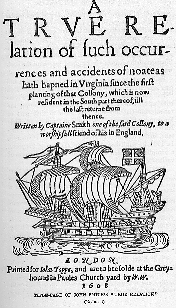He had been in Russia, in Germany, in Spain, and in Africa, and was familiar with the islands of the Mediterranean and those of the eastern Atlantic. Smith afterward wrote a narrative of his singularly full and adventurous life, not sparing, apparently, the embellishment which in his time seems to have been reckoned a natural feature of narrative art. The honesty of his statements has been doubted, perhaps to the point of injustice; and at the present time a reaction is to be seen which presents the writings of the sturdy old adventurer in a more favorable light.1
It was natural enough that such a daring rover should catch the spirit of enthusiasm with which the exploration and settlement of the New World had inflamed Englishmen of his time and type. And it was a recognition of his experience and practical sagacity which led to his appointment as a member of the Council at the head of affairs in the Jamestown colony.
The True Relation.
In so far as the literary accomplishments of Captain John Smith have any immediate connection with
American history, our interest centres upon his True Relation of such occurrences and accidents of
noate as hath hapned in Virginia since the first planting of that Collony, which is now resident in the
South part thereof, till the last returne from thence (London, 1608). Smith's writings are plain, blunt narratives,
which please by their rough vigor and the breezy picturesqueness of his rugged, unaffected style. Hardly
to be accounted literature except by way of compliment, the True Relation is not unworthy of its place
in our literary record as the first English book produced in America. It supplies our earliest chronicle
of the perils and hardships of our American pioneers. The romantic story of Pocahontas is found in its
pages, briefly recounted by the writer in terms which hardly warrant its dismissal as a myth; and many
another thrilling incident of that distressing struggle with the wilderness which makes a genuine appeal
to the reader now, as it undoubtedly did to the kinsmen of the colonists in England for whom the book
was originally prepared. 
Other writings.
Smith was the author of several other narrative and descriptive pamphlets in which he recounted the early history of the colonies at Plymouth and on Massachusetts Bay. Indeed, it was the redoubtable Captain who first gave to that part of the country the name New England; and to the little harbor on Cape Cod, before the coming of the Puritans, Smith had already given the name of Plymouth. In 1624, he published A General History of Virginia, a compilation edited in England from the reports of various writers.
William Strachey, fl. 1609-1618.
Another interesting chronicle of this perilous time was written in the summer of 1610 by a gentleman recently arrived at Jamestown after a stormy and eventful voyage. This vivid narrative, called A true Reportory of the wracke and redemption of Sir Thomas Gates, knight, upon and from the ilands of the Bermudas, his coming to Virginia, and the estate of that colony, was written by William Strachey, of whose personality little is known. The tremendous picture of shipwreck and disaster is presented in a masterly style.
"The clouds gathering thick upon us, and the winds singing and whistling most unusually, . . . a dreadful storm and hideous began to blow from out the Northeast, which swelling and roaring as it were by fits, some hours with more violence than others, at length did beat all light from heaven, which like an hell of darkness, turned black upon us. . . .
"Prayers might well be in the heart and lips, but drowned in the outcries of the Officers, -- nothing heard that could give comfort, nothing seen that might encourage hope. . . .
"The sea swelled above the Clouds and gave battle unto heaven.
| Previous page | Back | Home | Email this | Search | Discuss | Bookmark | Next chapter/page |
See our FAQ for more details.